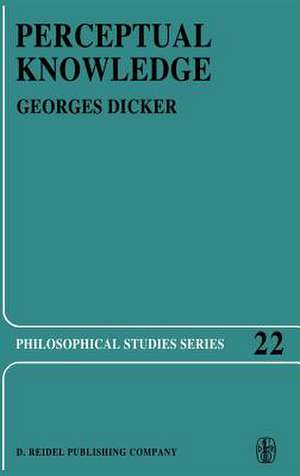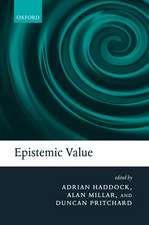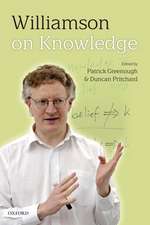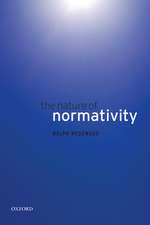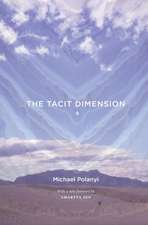Perceptual Knowledge: An Analytical and Historical Study: Philosophical Studies Series, cartea 22
Autor Georges Dickeren Limba Engleză Hardback – 31 oct 1980
| Toate formatele și edițiile | Preț | Express |
|---|---|---|
| Paperback (1) | 637.78 lei 6-8 săpt. | |
| SPRINGER NETHERLANDS – 12 oct 2011 | 637.78 lei 6-8 săpt. | |
| Hardback (1) | 645.14 lei 6-8 săpt. | |
| SPRINGER NETHERLANDS – 31 oct 1980 | 645.14 lei 6-8 săpt. |
Din seria Philosophical Studies Series
-
 Preț: 407.78 lei
Preț: 407.78 lei - 15%
 Preț: 644.95 lei
Preț: 644.95 lei - 18%
 Preț: 1120.18 lei
Preț: 1120.18 lei - 18%
 Preț: 1005.43 lei
Preț: 1005.43 lei - 15%
 Preț: 640.06 lei
Preț: 640.06 lei -
 Preț: 381.21 lei
Preț: 381.21 lei -
 Preț: 391.61 lei
Preț: 391.61 lei - 15%
 Preț: 640.88 lei
Preț: 640.88 lei - 15%
 Preț: 639.25 lei
Preț: 639.25 lei - 18%
 Preț: 1221.51 lei
Preț: 1221.51 lei - 18%
 Preț: 947.18 lei
Preț: 947.18 lei - 18%
 Preț: 955.56 lei
Preț: 955.56 lei - 18%
 Preț: 950.96 lei
Preț: 950.96 lei - 15%
 Preț: 645.47 lei
Preț: 645.47 lei - 15%
 Preț: 635.79 lei
Preț: 635.79 lei - 15%
 Preț: 644.82 lei
Preț: 644.82 lei - 18%
 Preț: 950.66 lei
Preț: 950.66 lei -
 Preț: 386.00 lei
Preț: 386.00 lei - 15%
 Preț: 644.82 lei
Preț: 644.82 lei - 15%
 Preț: 642.18 lei
Preț: 642.18 lei - 15%
 Preț: 643.48 lei
Preț: 643.48 lei - 18%
 Preț: 944.99 lei
Preț: 944.99 lei - 15%
 Preț: 638.76 lei
Preț: 638.76 lei - 20%
 Preț: 553.25 lei
Preț: 553.25 lei - 20%
 Preț: 560.31 lei
Preț: 560.31 lei - 18%
 Preț: 951.29 lei
Preț: 951.29 lei - 18%
 Preț: 893.40 lei
Preț: 893.40 lei - 20%
 Preț: 566.76 lei
Preț: 566.76 lei - 18%
 Preț: 951.77 lei
Preț: 951.77 lei
Preț: 645.14 lei
Preț vechi: 758.99 lei
-15% Nou
Puncte Express: 968
Preț estimativ în valută:
123.46€ • 128.42$ • 101.93£
123.46€ • 128.42$ • 101.93£
Carte tipărită la comandă
Livrare economică 14-28 aprilie
Preluare comenzi: 021 569.72.76
Specificații
ISBN-13: 9789027711304
ISBN-10: 9027711305
Pagini: 238
Ilustrații: IX, 227 p.
Dimensiuni: 210 x 297 x 19 mm
Greutate: 0.55 kg
Ediția:1980
Editura: SPRINGER NETHERLANDS
Colecția Springer
Seria Philosophical Studies Series
Locul publicării:Dordrecht, Netherlands
ISBN-10: 9027711305
Pagini: 238
Ilustrații: IX, 227 p.
Dimensiuni: 210 x 297 x 19 mm
Greutate: 0.55 kg
Ediția:1980
Editura: SPRINGER NETHERLANDS
Colecția Springer
Seria Philosophical Studies Series
Locul publicării:Dordrecht, Netherlands
Public țintă
ResearchCuprins
One: A Philosophical Problem Concerning Perception and Knowledge.- 1. Why Perception Does not Amount to Knowledge.- 2. Does Perception Under Normal Conditions of Observation Amount to Knowledge?.- 3. The Requirement that the Conditions be Known to be Normal.- 4. An Attempt to Avoid the Regress: The Sense-Datum Theory.- Two: The Argument from Perceptual Relativity.- 1. Exposition of the Argument.- 2. Evaluation of the Argument.- Three: The Argument from Causation.- 1. Some Ineffective Versions of the Argument.- 2. An Epistemological Version of the Argument.- 3. Psychological and Epistemic Immediacy: A Crucial Distinction.- Four: The Argument from Hallucination.- 1. Analysis of the Argument from Hallucination.- 2. A Reformulation of the Argument.- Five: The Causal Theory of Perception.- 1. General Formulation of the Causal Theory.- 2. The Analytic Thesis.- 3. Does the Causal Theory Imply that Physical Objects are Unperceivable?.- 4. The Justification Thesis (I).- 5. The Justification Thesis (II).- Six: Phenomenalism.- 1. Ontological Phenomenalism: Its Advantages.- 2. Ontological Phenomenalism: Its Paradoxes.- 3. The Linguistic Version of the Sense-Datum Theory and Analytical Phenomenalism.- Seven: Phenomenalism and the Causal Theory of Perception: A Combined Theory.- 1. Preliminary Considerations in Favor of a Combined Theory.- 2. The Adverbial Theory of Appearing.- 3. A Combined Theory.- 4. Epistemological Phenomenalism and ‘Critical Cognitivism’.- 5. Epistemological Phenomenalism (I): The Entailment of Appear-Statements by Thing-Statements.- 6. Epistemological Phenomenalism (II): The Entailment of Thing-Statements by Appear-Statements.- Index of Names.- Index of Subjects.
